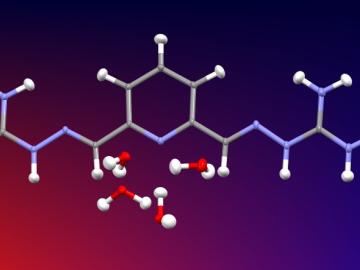
Filter News
Area of Research
- Advanced Manufacturing (5)
- Biology and Environment (21)
- Computational Biology (1)
- Computational Engineering (1)
- Energy Frontier Research Centers (1)
- Energy Science (72)
- Fusion and Fission (6)
- Fusion Energy (7)
- Isotopes (2)
- Materials (75)
- Materials for Computing (14)
- National Security (6)
- Neutron Science (65)
- Nuclear Science and Technology (12)
- Nuclear Systems Modeling, Simulation and Validation (1)
- Supercomputing (24)
- Transportation Systems (2)
News Type
News Topics
- (-) Advanced Reactors (25)
- (-) Biomedical (28)
- (-) Composites (23)
- (-) Molten Salt (8)
- (-) Nanotechnology (41)
- (-) Neutron Science (81)
- (-) Polymers (23)
- (-) Transportation (62)
- 3-D Printing/Advanced Manufacturing (82)
- Artificial Intelligence (51)
- Big Data (25)
- Bioenergy (42)
- Biology (47)
- Biotechnology (14)
- Buildings (36)
- Chemical Sciences (48)
- Clean Water (16)
- Computer Science (105)
- Coronavirus (28)
- Critical Materials (23)
- Cybersecurity (20)
- Education (3)
- Element Discovery (1)
- Emergency (1)
- Energy Storage (75)
- Environment (86)
- Exascale Computing (14)
- Fossil Energy (2)
- Frontier (17)
- Fusion (26)
- Grid (38)
- High-Performance Computing (44)
- Hydropower (6)
- Irradiation (2)
- Isotopes (25)
- ITER (5)
- Machine Learning (27)
- Materials (96)
- Materials Science (90)
- Mathematics (3)
- Mercury (5)
- Microelectronics (1)
- Microscopy (28)
- National Security (21)
- Nuclear Energy (47)
- Partnerships (33)
- Physics (30)
- Quantum Computing (18)
- Quantum Science (43)
- Security (13)
- Simulation (19)
- Space Exploration (13)
- Statistics (2)
- Summit (30)
Media Contacts

OAK RIDGE, Tenn., May 14, 2019—Advanced Research Systems, Inc., has licensed a technology designed to automatically refill liquid helium used in laboratory equipment for low-temperature scientific experiments, which will reduce downtime, recover more helium and increase overall efficiency.

In a step toward advancing small modular nuclear reactor designs, scientists at Oak Ridge National Laboratory have run reactor simulations on ORNL supercomputer Summit with greater-than-expected computational efficiency.

OAK RIDGE, Tenn., March 20, 2019—Direct observations of the structure and catalytic mechanism of a prototypical kinase enzyme—protein kinase A or PKA—will provide researchers and drug developers with significantly enhanced abilities to understand and treat fatal diseases and neurological disorders such as cancer, diabetes, and cystic fibrosis.


Oak Ridge National Laboratory’s latest Transportation Energy Data Book: Edition 37 reports that the number of vehicles nationwide is growing faster than the population, with sales more than 17 million since 2015, and the average household vehicle travels more than 11,000 miles per year.

OAK RIDGE, Tenn., March 4, 2019—A team of researchers from the Department of Energy’s Oak Ridge National Laboratory Health Data Sciences Institute have harnessed the power of artificial intelligence to better match cancer patients with clinical trials.

Researchers used neutron scattering at Oak Ridge National Laboratory’s Spallation Neutron Source to investigate the effectiveness of a novel crystallization method to capture carbon dioxide directly from the air.

Oak Ridge National Laboratory scientists have created open source software that scales up analysis of motor designs to run on the fastest computers available, including those accessible to outside users at the Oak Ridge Leadership Computing Facility.

OAK RIDGE, Tenn., Feb. 8, 2019—The Department of Energy’s Oak Ridge National Laboratory has named Sean Hearne director of the Center for Nanophase Materials Sciences. The center is a DOE Office of Science User Facility that brings world-leading resources and capabilities to the nanoscience resear...

Oak Ridge National Laboratory scientists analyzed more than 50 years of data showing puzzlingly inconsistent trends about corrosion of structural alloys in molten salts and found one factor mattered most—salt purity.


